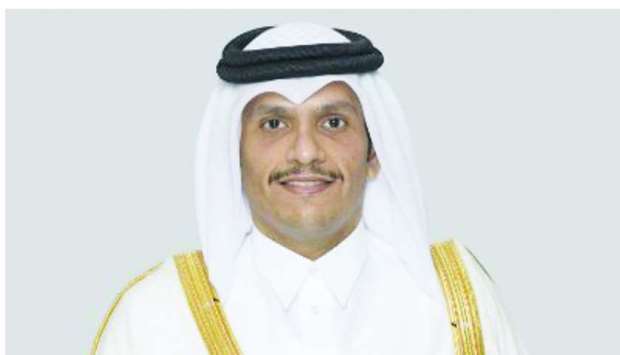*Libyan conflict must be resolved through political process
*Qatar hopes inter-Afghan dialogue will start soon
*International co-operation needed to fight pandemics like Covid-19
Israel's plan to annex some parts of the West Bank, if implemented, will have catastrophic implications for the entire region and Qatar rejects any such move, HE the Deputy Prime Minister and Minister of Foreign Affairs Sheikh Mohamed bin Abdulrahman al-Thani has said.
In an interview with 'Le Monde', HE Sheikh Mohamed bin Abdulrahman al-Thani said Israeli Prime Minister Benjamin Netanyahu's intention to announce the annexation of parts of the West Bank in July will bury any hope for a settlement of the Palestinian issue in the future.
HE the Deputy Priminister of Foreige Minister and Mn Affairs reiterated Qatar's rejection of the move, saying: " We reject this move, which amounts to planting the last nail in the coffin of the peace process. The annexation of these territories will bury any possibility of settling the conflict in the future. The security, economic and social implications will be catastrophic for the entire region. Many states share this position. But the reality is that we do not see agreement among the international community on how to enforce this position. It is something as old as the Israeli occupation."
On Qatar's position regarding the global debate on the coronavirus disease (Covid-19) and what must be changed so that a similar health crisis does not happen again, HE Sheikh Mohamed bin Abdulrahman al-Thani said: " No country can feel safe anymore, this is the novelty. Previous epidemics, like those of Sars and Ebola, had not really spread to regions other than those in which they had emerged. But the Covid-19 pandemic has reached all of us. So the first lesson from this crisis is that every country in the world needs a strong, resilient health system that can cope. Second, there is a need to strengthen multilateralism and international cooperation, to ensure that countries have a unified platform for exchanging views and experience. Finally, we must guarantee the protection of supply chains, so that we can meet our domestic needs, but also the needs of other countries."
Responding to a question on the lessons that can be learned from the fiasco of retired General Khalifa Haftar, who has just lost the battle of Tripoli against the forces of Libya's Government of National Accord, HE the Minister said; "We say, since the Skhirat agreement in 2015, that the conflict in Libya must be resolved by a political process and not by coups and military aggression. Haftar has always preferred violence. He is only interested in the political process when he loses a round, only to come back in force. If there is a lesson to be learned, it is that the international community must comply with the political process, within the framework of international law and UN resolutions. Doing so would have saved many Libyan lives and saved the country's significant resources."
On what can be done to preserve the historic peace agreement between the United States and the Afghan Taliban, signed in Doha last February, from collapse, after several attacks took place in Afghanistan, HE Sheikh Mohamed said: "There is no collapse. This agreement has always been seen as a first step. True peace will only come when the Afghanistan government on the one side and the Taliban on the other speak together. We hope that this inter-Afghan dialogue will start soon."
HE the Deputy Prime Minister and Minister of Foreign Affairs also affirmed that Qatar is steadfast in its position of openness to dialogue and finding a long-term solution to the irrational Gulf crisis as long as it does not infringe on the sovereignty of Qatar and does not violate international law.

